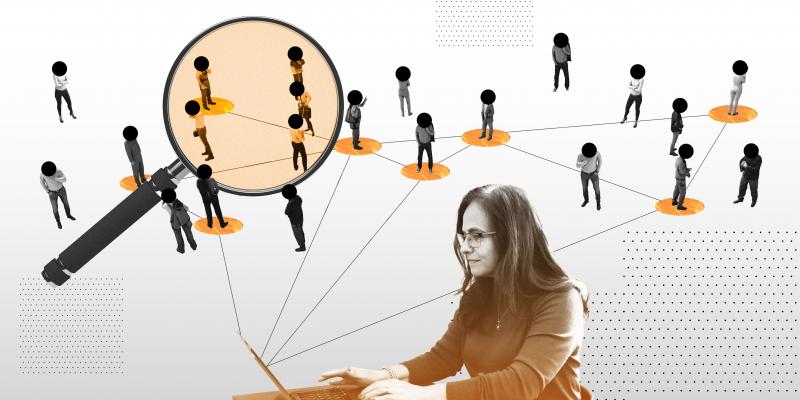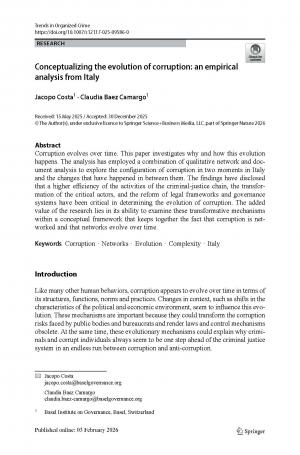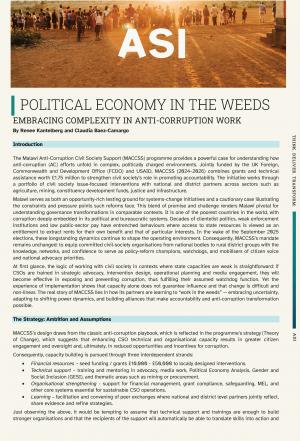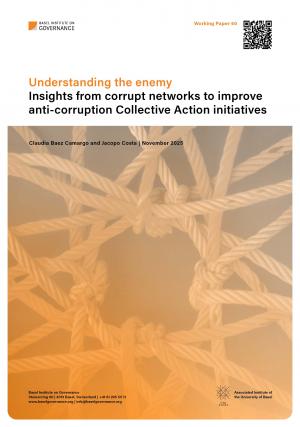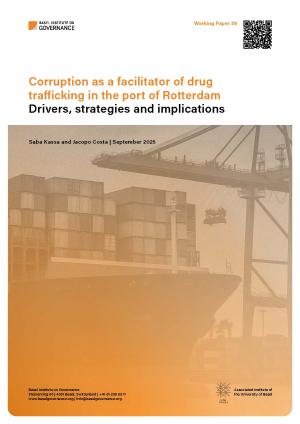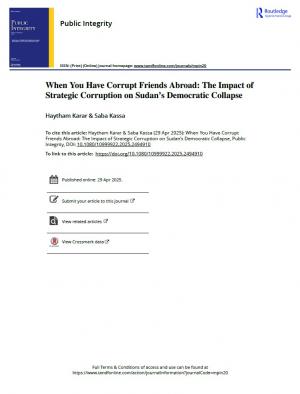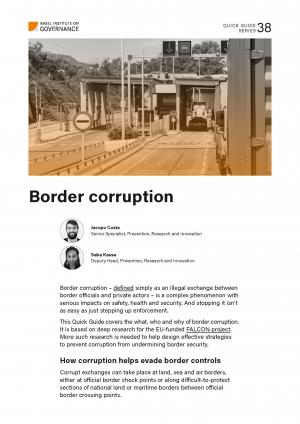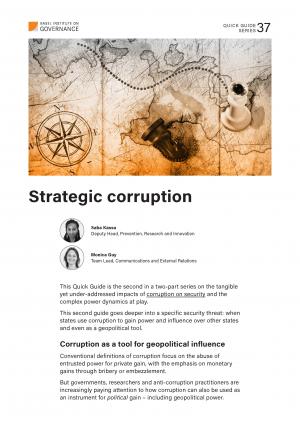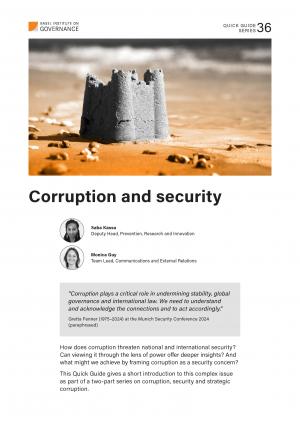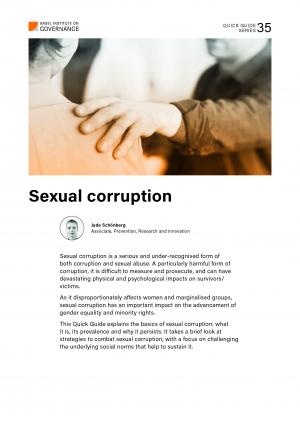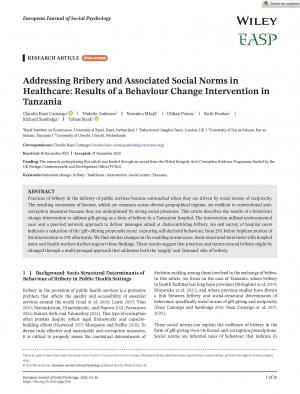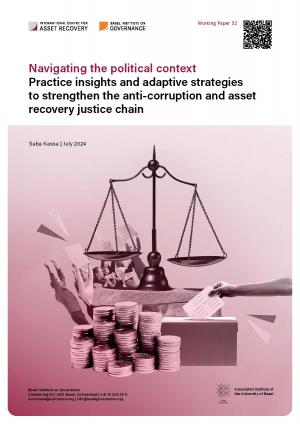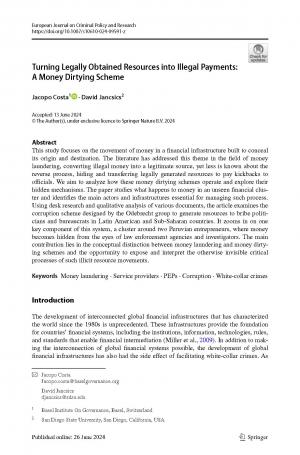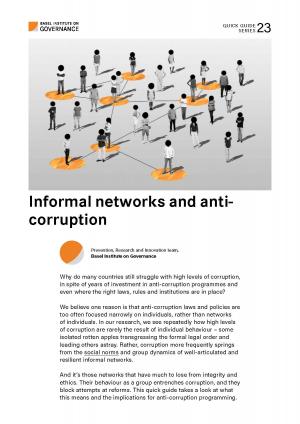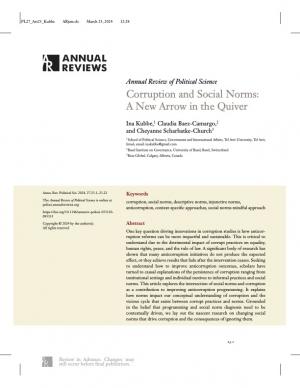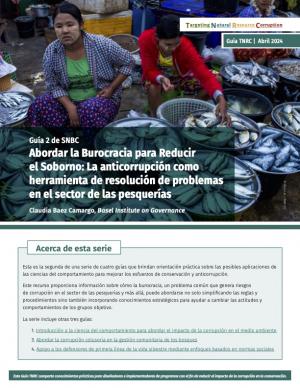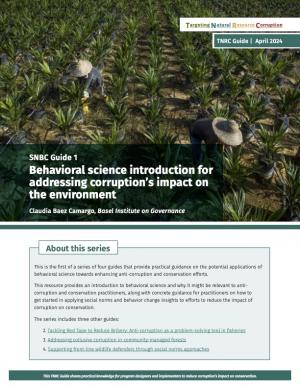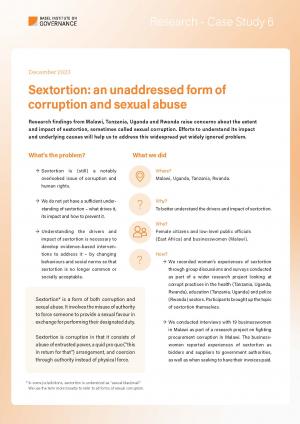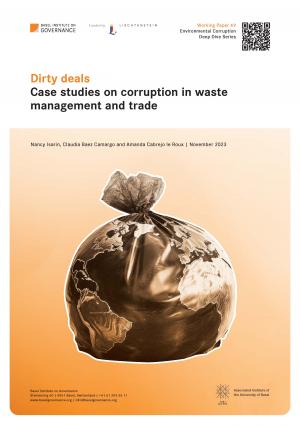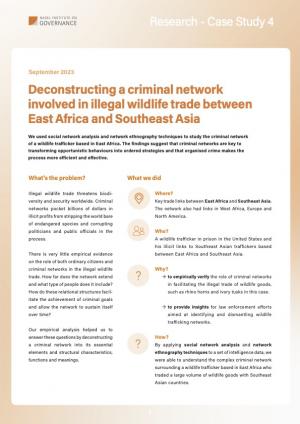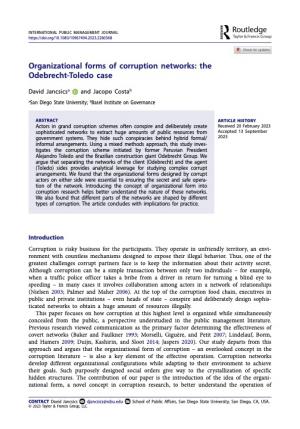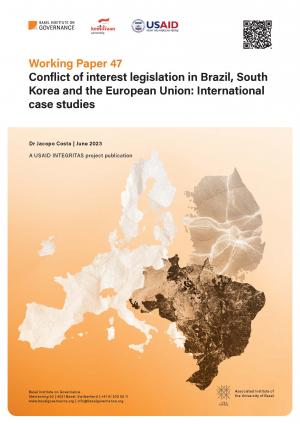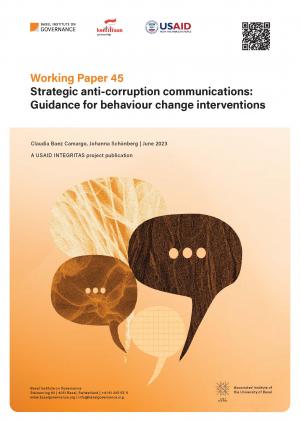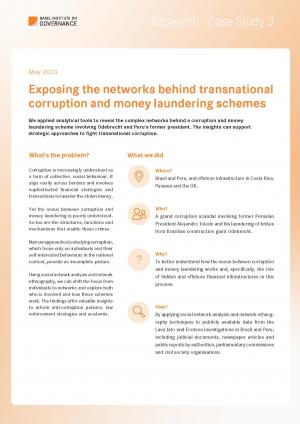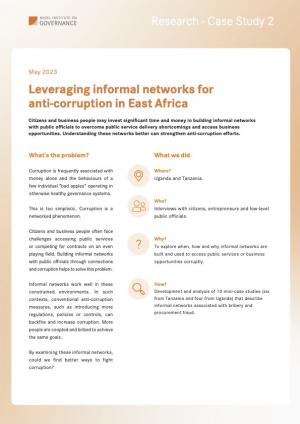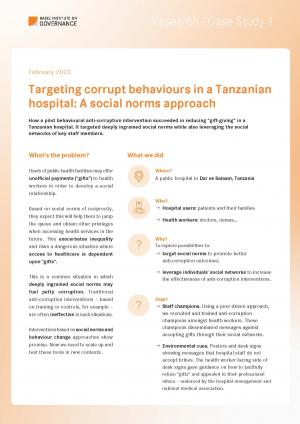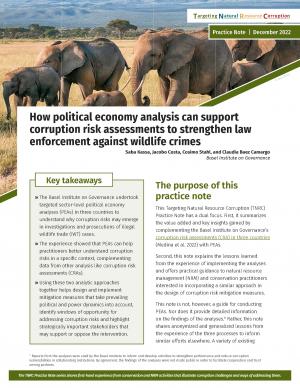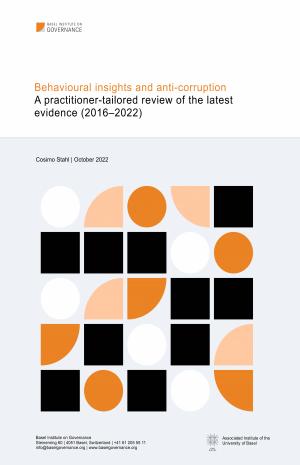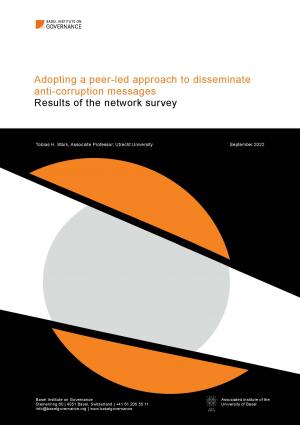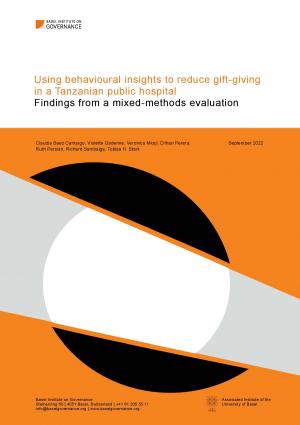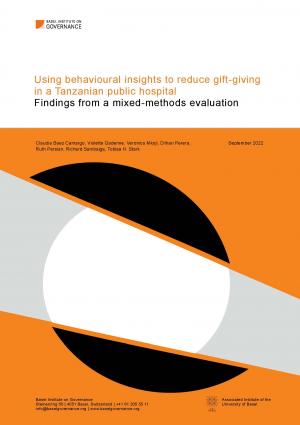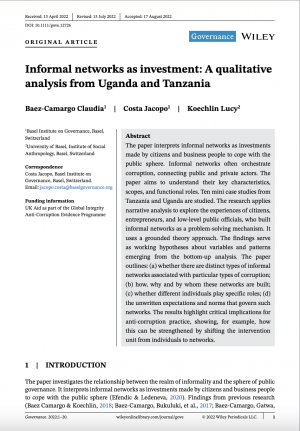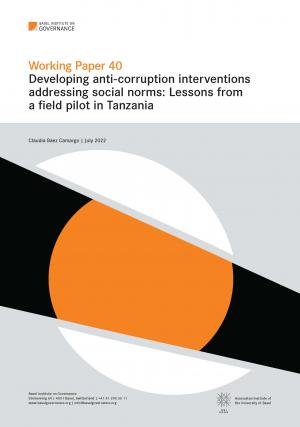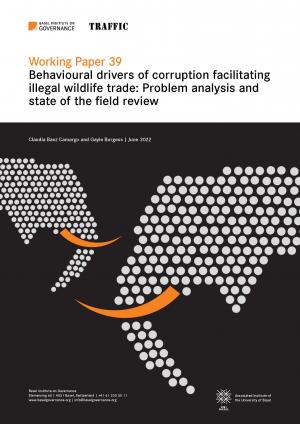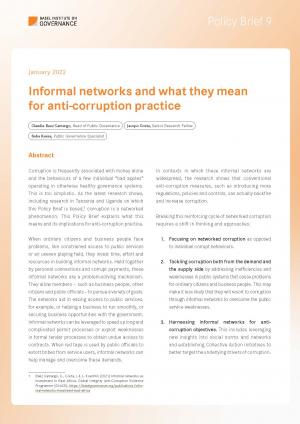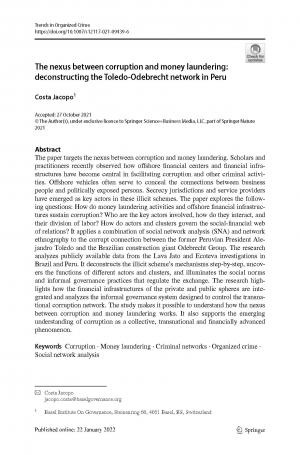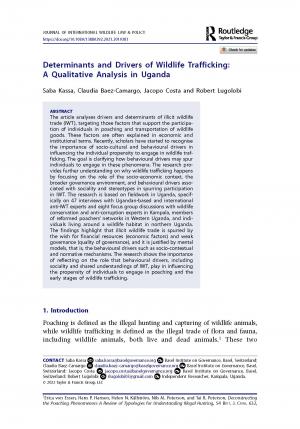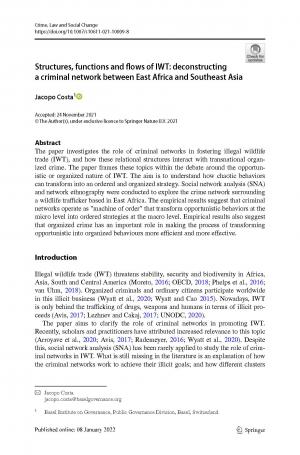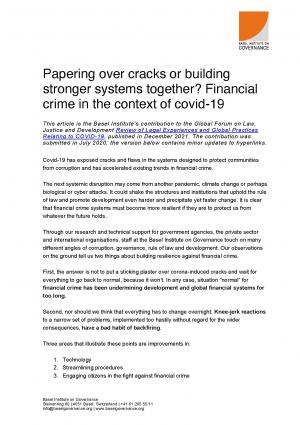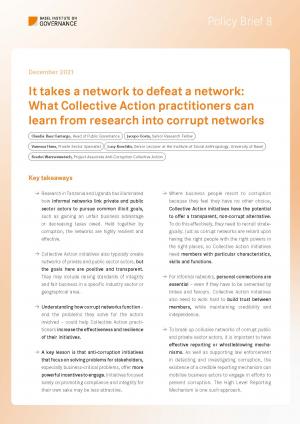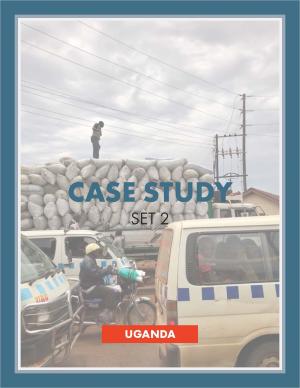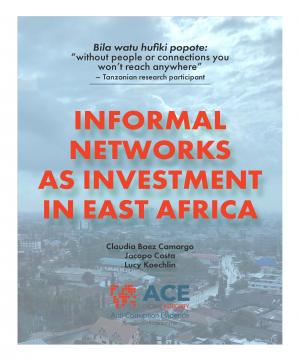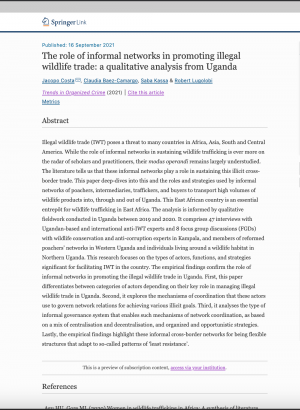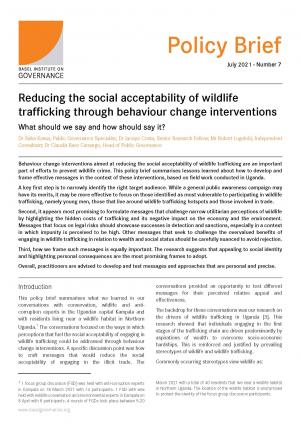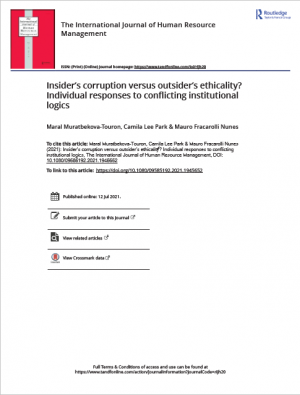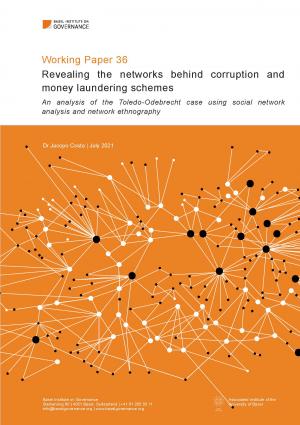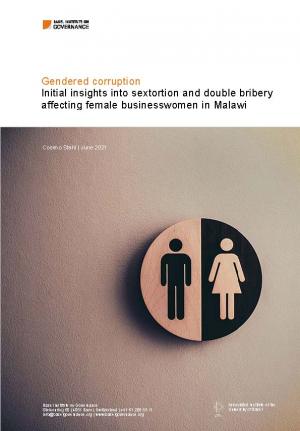Prevention, Research and Innovation
Developing smarter ways to prevent corruption and strengthen governance
Our Prevention, Research and Innovation team connects rigorous research with hands-on anti-corruption practice. Through in-depth research and the piloting of innovative interventions, we generate evidence on what works to prevent corruption in real-world settings.
This evidence underpins the work of the entire Institute and supports partners across the global anti-corruption community.
Our work starts from the recognition that corruption is ultimately about people’s behaviours, shaped by social norms, informal practices and political realities. Effective anti-corruption reform therefore depends on understanding how corruption functions and evolves in specific contexts, and how political and institutional dynamics influence the prospects for change.
By combining research with practical engagement, we help design interventions that are realistic, context-sensitive and capable of delivering sustainable impact.
From evidence to action
We provide technical assistance to donors and practitioners to design and implement anti-corruption strategies and interventions grounded in research and practical experience. Our support includes:
- political economy analysis and corruption diagnostics;
- behaviour change approaches;
- mainstreaming anti-corruption across development portfolios; and
- the development of monitoring and evaluation frameworks and indicators.
Our work goes beyond laws and formal rules, focusing instead on changing behaviours through participatory approaches that engage local stakeholders and build ownership.
Alongside strategy design, we develop and test intervention pilots that generate evidence of what works in practice. Our research has contributed to tangible results, including reductions in bribery and favouritism in the health sector and improved understanding of how corruption affects public service delivery, environmental protection and other critical areas.
We share insights from this work through open-access publications, policy forums and teaching, helping to inform and strengthen anti-corruption efforts worldwide.
News
Frequently asked questions
- What are your key thematic areas of work?
-
Our research incorporates a variety of novel approaches and methodologies, but our aim is consistent: to generate evidence on drivers of corruption and anti-corruption interventions and to translate such insights into practice. Key thematic areas are:
- Social norms and behaviour change (SNBC) anti-corruption approaches
- Social network analysis and network-based anti-corruption interventions
- Informality and informal governance
- Translating research findings into strategic corruption prevention approaches
- Monitoring and evaluation frameworks and development of indicators of anti-corruption progress
- Applying our anti-corruption tools and approaches to concrete issue areas such as health governance, environmental crime and degradation and sextortion.
- What does your research show about informal governance and corruption?
-
In a nutshell, that corruption is often linked to informal practices and hidden behaviours.
Our research on informal governance and behavioural drivers of corruption has shown the importance of causes of corruption that are hidden from plain sight. Corrupt behaviour is often linked to informal practices that are widely used because they solve problems, from obtaining a driver’s license to winning elections.
Decision makers often overlook such factors. Yet these indicators can help explain why traditional anti-corruption approaches that rely on legal reforms or law enforcement only tend to have limited effectiveness in many contexts.
- What do informal social networks have to do with corruption?
-
A salient recurrent finding in our research is the centrality of informal networks as effective mechanisms to achieve particular goals by undermining or side-lining formal laws and public-sector regulations. Corruption takes place through these networks, not by individuals acting in isolation.
Specifically, we have found that these informal social networks often work to connect the demand and supply sides of corruption. Furthermore, such informal social networks are resilient and become entrenched because they are bound together by locally accepted informal practices and social norms.
- How are social norms relevant to anti-corruption practice?
-
Through our research, we explore the power of social norms to impact attitudes and behaviours and to build stronger anti-corruption networks.
Many patterns of corrupt behaviour are reinforced by locally relevant social norms. For instance, social norms around reciprocating gifts and favours, and the obligation to share with one’s group, translate into practices of embezzlement, bribery and favouritism in the realm of public service delivery.
We thus believe that improving anti-corruption practice will depend on the degree to which we recognise and constructively harness social norms and networks in local contexts. Therefore, we test pilot approaches to address social norms of bribery in order to expand and boost the anti-corruption practitioners’ toolbox.
- What are some current and past research projects?
-
Here is a flavour of the type of deep, detailed research project that we undertake. You can find all our research outputs in our Publications database.
FALCON: an anti-corruption EU research project
The Basel Institute, together with the University of Basel, is part of a consortium of 25 organisations from 15 countries in the FALCON: Fight Against Large-scale Corruption and Organised Crime Networks programme.
The programme, funded by Horizon Europe, brings law enforcement, social scientists and experts in data analysis and AI to seek technologically advanced solutions to address critical forms of corruption across Europe including:
- public procurement fraud;
- circumvention of sanctions against oligarchs and kleptocrats;
- corruption schemes linked to smuggling at border crossings;
- conflicts of interest of politically exposed persons.
Learn more about the programme.
Addressing bribery and favouritism in the Tanzanian health sector: a behavioural approach
Funded by the UK Global Integrity Anti-Corruption Evidence Programme (GI-ACE), this pilot project used a social norms and behaviour change approach to address bribery (“gift-giving”) and favouritism in a Tanzanian hospital. The headline result was a 14–44% reduction in gift-giving intentions, attitudes and positive beliefs among hospital users, based on surveys.
Our intervention showed that social norms and behaviour change approaches have real potential to tackle deeply ingrained patterns of corruption.
See the research case study or go straight to the research report and related Working Paper.
Harnessing informality: Designing anti-corruption network interventions and strategic use of legal instruments
This GI-ACE project aimed to shed light on the functioning of informal networks in East Africa and how these are associated with different types of corruption.
The report and 10 case studies (six from Tanzania and four from Uganda) illustrate ways in which citizens and business people invest significant efforts in building informal social networks to overcome shortcomings in public service delivery and to access business opportunities.
The findings will help anti-corruption practitioners design more effective interventions by taking into account – and leveraging – the informal relationships and social networks that underlie people's behaviour. A webinar in November 2021 highlighted the main findings of this research project as well as its implications for practitioners.
See the short overview.
Informal governance and corruption: Transcending the principal-agent and collective action paradigms
From 2016–2018, the Basel Institute on Governance, in partnership with University College London and SOAS University of London, researched informality and its relationship with corruption and governance in East Africa and Eurasia. The findings shed light on why "conventional" anti-corruption practices have been so unsuccessful to date, and on the kinds of policies and interventions that could have a bigger impact in the fight against corruption.
The dedicated Informal Governance website for this UK-funded project provides access to multimedia material synthesising the research findings, including videos, country-by-country reports and comparative summaries, policy implications as well as all project-related publications.
Corruption, social norms and behaviours in East Africa
This UK-funded project focused on identifying the behavioural factors that influence the propensity of citizens and public service providers to engage in, resist and report corrupt transactions in Rwanda, Tanzania and Uganda.
A comparative analysis extracted some of the first findings on behavioural drivers of corruption emerging from field work as well as lessons for practitioners.
Behavioural insights and anti-corruption: A practitioner-tailored review of the latest evidence (2016–2022)
Social norms and behaviour change (SNBC) approaches to address corruption appear promising because they respond to a growing body of descriptive evidence on how certain social norms and mental models drive corruption, particularly in fragile contexts.
Based on a synthesis of the evidence, the report summarises behavioural explanations (i.e. insights and pitfalls) for why some of these SNBC approaches have failed, while others have been effective. The aim is to provide practitioners designing SNBC interventions with evidence to help them develop effective programmes and avoid common pitfalls.
The research was funded by the Deutsche Gesellschaft für Internationale Zusammenarbeit (GIZ).
Stop corruption from fueling wildlife trafficking between East Africa and Southeast Asia
The research and community engagement component of this cross-divisional project focused on understanding the context-specific drivers of wildlife trafficking and the role of informal social networks and their associated corrupt practices in facilitating it.
The project was funded by PMI Impact.
Behavioural drivers of corruption facilitating illegal wildlife trade
As part of a cross-divisional research programme for the Targeting Natural Resource Corruption (TNRC) project, we have collaborated with wildlife specialists TRAFFIC on a joint problem analysis and “state of the field” review on behavioural drivers of corruption facilitating illegal wildlife trade. The authors discussed the findings from this exercise with local experts in a webinar.
We drafted four resources for practitioners to illustrate and offer practical advice on adopting a Social Norms and Behaviour Change approach to fight corruption in the conservation sphere. Learn more in the September 2023 webinar
In support of the broader Basel Institute’s Green Corruption programme, we conducted political economy analyses of the political context of illegal wildlife trade investigations and prosecutions in Malawi, Uganda, Peru, Bolivia and Ecuador. These insights were summarised in practice notes and a six-step guide.
The team also supported the Green Corruption Deep Dive report on waste management systems and, in support of a cross-divisional programme with the USAID Indonesia Integrity Initiative, prepared international case studies on conflict of interest and guidance for strategic communications and behaviour change interventions.
- Do you offer technical assistance in designing corruption prevention interventions?
-
Certainly. Based on the latest research and tools, our technical assistance services help donors and practitioners to develop feasible and sustainable strategies that strengthen governance, prevent corruption and are acceptable to all stakeholders.
Our services are flexible, so please contact us to discuss your needs.
- Anti-corruption strategy development. Examples of our work in this area include our support to the development of SDC’s new strategic anti-corruption guidelines, our contribution to the development of Malawi’s 2019 National Anti-Corruption Strategy II, and our work with the several Swiss cooperation offices to identify entry points for interventions supporting anti-corruption and local democratic governance.
- Corruption diagnoses. To assist anti-corruption practitioners and donor agencies, we conduct targeted corruption diagnoses encompassing political economy analysis as well as stakeholder and resource mapping. The diagnosis helps to identify entry points for anti-corruption work on the basis of relevance, feasibility and sustainability.
- Designing and testing intervention pilots which can provide evidence of what types of approaches can work to change behaviours resulting in better control of corruption in different sectors and contexts.
- Developing tailored monitoring and evaluation approaches to measure the progress and impact of projects and interventions aimed at fighting corruption and improving democratic governance.
- Leading on-the-ground corruption prevention projects as part of cross-divisional programmes of work combining enforcement and prevention.
- Do you offer training courses?
-
We now offer an advanced postgraduate course on Mastering Today's Anti-Corruption Challenges with the University of Basel.
We also develop tailored training for partner agencies and donors, usually as part of a wider programme of technical assistance. The training helps these organisations' staff to sharpen their skills in order to better evaluate the drivers of corruption that affect their programming and to develop evidence-based anti-corruption approaches. Through interactive sessions and real-life tasks, participants may learn how to develop a research plan, conduct corruption risk assessments, develop social accountability initiatives and translate research findings into tailored interventions. These training courses are custom-designed based on some of the topics outlined in this flyer.



